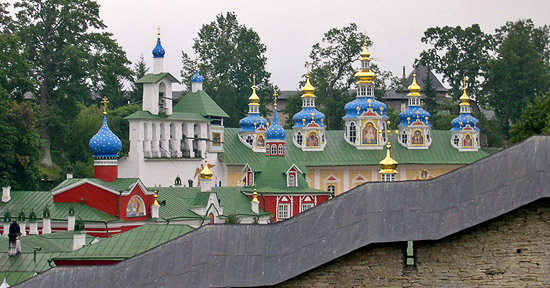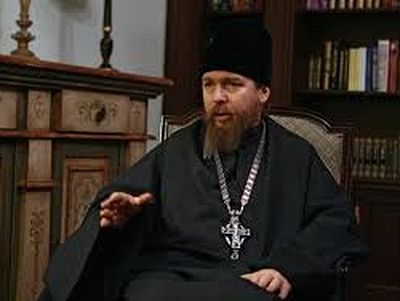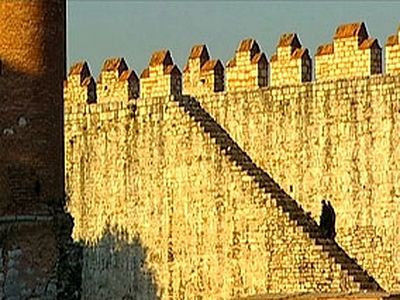A book by Archimandrite Tikhon (Shevkunov) is now in process at the Sretensky Monastery publishing house. It contains true stories that took place throughout the years, and were later used to illustrate points in the author’s sermons. The story that we are publishing today was related in a sermon on God’s Providence given in the Donskoi Monastery, 1992.
 The Holy Dormition-Pskov Caves Monastery. Photograph from temples.ru.
The Holy Dormition-Pskov Caves Monastery. Photograph from temples.ru.
This took place in 1986. I was still a young novice then, and had only one month previously been transferred from the Pskov-Caves Monastery to Moscow. Some one had had told Archbishop Pitirim, the head of the Moscow Patriarchate Publishing Department, that in the Pskov-Caves Monastery there was a novice (me) working in the cow barn, who had a degree from the university of cinematography. That very year, the government authorities had finally granted permission to the Church to prepare for the celebration of one thousand years since the Baptism of Russia. Trained people were needed right away, because for the first time in history Church life would be shown on television, and films would be made about Orthodoxy. So, I would come in handy.
For me, returning to the city that I had left only a few years earlier for the Pskov-Caves Monastery, was a real tragedy. But my spiritual father, Fr. John (Krestiankin) said, “Obedience is above all. Stay in the place that your superiors have put you.” Nevertheless, once I was in Moscow, I took every opportunity to return to my beloved monastery, if only for a day.
Well, one day Fr. Zenon, a monk-iconographer who lived in the Pskov-Caves Monastery at the time, called me on the phone, all upset. Without explaining anything over the phone, he asked me to come to the monastery immediately. I don’t remember what excuse I gave to Vladyka Pitirim, but the next morning I was in Fr. Zenon’s cell.
What did Fr. Zenon tell me? Under conditions of great secrecy, he told me how several weeks ago, from the mountains of Abhazia, from the region where for some three or four decades monks had been living secretly under illegal circumstances, one monk was forced to descend into the world, and he was in serious danger.
Monks had been living illegally in the mountains near Sukhumi for a long time, from the very beginning of soviet rule. They had left the world forever to live in the inaccessible mountainous regions, hiding from the worldly authorities, and sometimes even from the ecclesiastical authorities. Amongst them were not a few true ascetics, who sought solitude for the sake of communion with God, ceaseless prayer, and contemplation. Others had left in protest against governmental and ecclesiastical injustice. They had torn up their soviet passports, fought against ecumenism and compromise; in a word—against all those things about which people in the Church at that time were silently complaining.
I was in those mountains once; the father confessor of the Holy Trinity-St. Sergius Lavra, Archimandrite Kirill (Pavlov) and Archimandrite Onuphry, who was then the dean of the Lavra, and now the Metropolitan of Chernovitsky, blessed me to go. My friends and I were secretly transporting a monk from the St. Sergius Lavra under illegal circumstances. That is a another story; but in any case, I was well acquainted with the house of Deacon Gregory and his wife, Olga, in Sukhumi on Kazbegi Street, where practically every journey began from legal existence into illegal existence in the Caucasian peaks. I knew as well two or three places along the road where Christians were hiding monks. Up steep mountain trails, from one cell to another, travelers would ascend to the hardly accessible and extraordinarily beautiful areas where the ascetics lived.
Of course, the authorities mercilessly persecuted the monks. They would catch them and imprison them, but the monks would nevertheless continue to live there, becoming for many an image of the indomitable Church.
So, Fr. Zenon told me that one of these monks was forced to descend from the mountains, and then turned up in Pechory (where the Pskov-Caves monastery is located). He was still quite young—twenty-two years old. His name was Augustine. I had heard about him from the monks of Sukhumi, but had never seen him myself. His mother had become a nun when he was four years old. She went to the mountains and took the boy with her. The boy was raised amongst the ascetics, and at age eighteen he was tonsured a monk. He lived in the cell with his mother, was educated under the guidance of the mountain elders, and never had a thought of leaving his desert solitude.
One day, however, when he was working somewhere on one of the mountain garden terraces, while his mother was doing some other domestic work, some Abhazi hunters discovered them. The hunters were drunk, and unceremoniously demanded that Augustine’s mother prepare them some food. The woman comprehended her powerless predicament (the hunters could report her and her son to the authorities upon their arrival in the village), and put the food on the table. But having eaten and drunk their fill, the hunters began coarsely forcing themselves upon this still young woman. She then said to them that it would be better that they burn her alive than violate her. And the wine- and passion-crazed hunters poured kerosene over her and lit her afire…
Augustine heard his mother’s terrifying scream from far away. He ran to the cell and beheld there a horrible sight: his mother, enveloped in flames, was thrashing around his poor hut while the hunters, now sobered, were running after her in a panic, trying to put out the fire. Seeing a man run into the house, the hunters were even more frightened, and fled. Augustine finally put out the fire that was burning his mother. She was already near death. He carried her to the nearest village, to the house of their friends, but she was beyond any help. The nun died, having received the Holy Mysteries, and after requesting her son not to avenge her, but rather to prayer for her wretched murderers.
Meanwhile the hunters came to themselves after what had happened, and where seriously worried. Whether this woman was a nun or not, whether she lived legally or illegally in the mountains, with or without a passport, they understood that in any case they would have to answer for this murder before the law should the word get out. They then began hunting down the only witness—that is, Augustine. When the elders who guided the young man’s life heard about it, they said to him, “They will find you anyway. It is better for you to leave the mountains. Labor in asceticism wherever you can; but if you stay here, they will kill you.”
Augustine heeded their advice. At first they sent him to the Holy Trinity-St. Sergius Lavra, but it was too dangerous for him to live their without a passport. Then they sent him to the Pskov-Caves Monastery.
You see, one monk from the mountains was already living in Pechory. He was very old, and had lived in the mountains for over forty years. But he became very ill, and the elders blessed him to get medical help in the world. The Father Superior of the Pskov-Caves Monastery, Fr. Gabriel, that fierce and all-powerful ruler of Pechory, had pity on this wanderer who came to him, and found a way through the police and the KGB to resolve the problem of this sick monk who had no documents, and allow him to live in the monastery. With the Superior’s help they even fixed his passport. Thus did he live in the almshouse, in the St. Lazarus wing of the monastery.
Hoping that Augustine might receive similar assistance, Fr. Zenon brought him to the Father Superior, but the latter was apparently in a rather bad mood at that moment. He only glanced briefly at Augustine and shouted angrily, “What kind of monk is that? They bring all sorts of bums and swindlers here! He should be taken to the police!” Fr. Zenon barely managed to drag the frightened and bewildered monk away to his cell.
“Oh, that Gabriel—the chekist!” Fr. Zenon said in his distress. “How could I have thought to take this angel to him?”
That this young monk was a simply angelic existence, Fr. Zenon related with perfect amazement:
“You cannot even imagine what sort of person this is! He eats daily no more than a five-year-old child does. His eyes are so pure and angelic. He is in a state of constant prayer!”
Fr. Zenon even added, “This is the only true monk that I have ever met in my whole life.”
Of course he said this heatedly, angered by the Father Superior’s rude treatment. But even so, according to Fr. Zenon, everyone who saw Augustine was truly amazed. It was a pity that the brothers’ father confessor, Archimandrite John (Krestiankin), was not present at the monastery at the time. He like no one else could have best advised what to do with this amazing young monk.
I asked where Fr. Augustine was now. It turned out that after the incident with the Superior, Fr. Zenon had sent him away from Pechory to avoid something worse, to his spiritual children, Vladimir Vigiliansky and his wife Olesa, in Moscow.
On the next day, when I returned to the capital city, I met this couple. Now many people know Fr. Vladimir Vigiliansky—he is in charge of the press service of the Patriarch of Moscow and All Russia; but then he was simply Volodya, a scholar at the Institute of Art Studies, and lived with his wife and three small children in the writers’ house on Prospect Mira. Their neighbors were such famous people as the singer Bulat Okujava, the cosmonaut Leonov, and the sports commentator Nicholai Ozerov. It was in that very building that Fr. Augustine was concealed like a special treasure. Of course, I couldn’t wait to see him. Then, at last, into a Moscow room on the ninth floor, like a man from another world, walks a young monk with long, unbridled hair to the shoulders, and wondrous, large, deep blue eyes.
We were left with the brightest impressions from this meeting, and heavily burdened with the unsolved question: What can we do to help him? Remember that this was the year 1986. If he were to go outside in his cassock (and he categorically refused to go out in secular clothing), with no documents, and the police should stop to check him, he would be arrested forthwith. Some lawyer friends of Volodya Vigiliansky explained to him that he would first of all be “pinned” with every unsolved crime committed over the past five years from Kaliningrad to Vladivostok. And they needed to be frank with themselves—it would be a convenient opportunity for the police to write off any number of serious crimes if they so wished.
But we were horrified at the very thought that this monk-ascetic who knew nothing of worldly life, this angelic jungle boy raised in the mountains on the writings of the holy fathers might end up, if not in prison, then in a temporary jail cell, or even in the army, where a healthy, twenty-two year old young man would end up in any case. And what if the worst thing should happen and he ends up in prison—this pure, sinless ascetic, who gave his whole life to God? We were shaken by this impending danger.
For the next few days we convulsively strove to find a way out of this predicament. Vladimir went for advice to the spiritual fathers of the Lavra. We pulled in our friends who knew lawyers. Someone even promised to get the popular singer, Alla Pugacheva, involved should we have to extricate Augustine from the police…
Meanwhile, Fr. Augustine lived his own life. He prayed in his room, which we already called a “cell,” and awaited our decision. Watching him, I noted how different traditions exist in regular monasteries and mountain hermitages. For example, I accidentally noticed that Fr. Augustine was wearing a priestly cross with precious stones under his cassock.
“Where did you get it? Or are you a secret priest?” I asked him, knowing that this does happen sometimes.
“No, I am not a priest,” replied Augustine. “When my elder died, he blessed me to have his cross. He told me that when I become a priest, I should wear it openly. Until such time, his cross would protect me.”
Or, that he had a beautiful censor, and he would cense his “cell” every day, for which practice he asked us to get him some charcoal and incense. I had never seen such a censor in our monasteries. Or, that when I invited him to read a kathisma together, I was quite surprised that Fr. Augustine made no few mistakes in the reading. I almost judged him, a monk, for such poor knowledge of the Psalter, but then quickly caught myself and guessed that in the Abhazi mountains he simply would not have had anyone to teach him correct Church Slavonic language.
Thus the days passed. Then we gradually began to notice that Fr. Augustine was changing. To be exact, and to call things by their name, he was being corrupted by our company! After all, unlike him, we were far from angelic; as it is written in the Psalter, With the elect shalt thou be elect, and with the perverse shalt thou be perverse. Well, the last part about perverse sinners was just about us—we could see daily the fruits of our destructive influence. Let’s say—once after long discussions about all possible plans to save Fr. Augustine without coming to any reasonable conclusions, we decided to at least enjoy some ice cream. The ice cream with nuts that cost twenty-eight kopecks was unexpectedly so tasty to our monk that he ate five portions one after the other, and then began to send Volodya’s son, Nika, every day to the nearby kiosk. We felt uncomfortable about refusing him, and therefore we trembled to see how we had really tempted Fr. Augustine—he could eat that cursed ice cream twenty-four hours a day!
The boy Nika is now grown, has graduated from the university, and serves as a deacon in the Moscow church of the Dormition in Pechatniki, but he well remembers his tearful confession that he had fed an excessive amount of ice cream to a mountain ascetic. Or, for example, Oleca’s brother had a tape recorder. Suddenly we saw how Augustine would sit next to him and listen to the Beatles! This brought us to a state of heavy shock. Depressed and helpless, we met again and again at the Vigiliansky apartment to decide what to do. Around that time, the Chavchavadze couple, Elena and Zurab, together with Igumen Dimitry from the St. Sergius Lavra (now the Archbishop of Vitebsk) joined our company.
But the last blow, to me at least, was when Fr. Augustine suddenly shouted from the balcony with joy, “Look! It’s Nicholai Ozerov!”
I was shocked. On the balcony of the neighboring apartment, on a floor below, really was the legendary sports commentator, who looked at the monk who recognized him with a good-natured laugh. But that is not the point.
“What Nicholai Ozerov? How do you know him? What Nicholai Ozerovs could there be for you?” I shouted at him, dragging him out of the balcony.
Right then, everything became clear. Fr. Augustine had found some old “Ogonek” magazines, and had spent long hours reading them in the solitude of his cell to kill time.
I then understood that we could not put off doing whatever we could to save this pure, uncorrupted monk from our society. Otherwise, there would be no forgiveness for us.
Amidst all these grave events, a solution suddenly arrived. It was found by my friend, Zurab Chavchavadze. He and his wife, Elena, are still parishioners of our Sretensky monastery. Zurab offered to take Augustine to the Georgian Patriarch, Ilya, in Tbilisi.
This was truly an excellent idea. Those who lived in the Soviet Union can recall how Georgia was in many ways a special territory within our enormous country. There was much possible there that people in, say, Pskov province, or Siberia, or in the Far East could not even imagine. For example, “naturalizing” a person, giving him proper documents. Especially since Fr. Augustine had lived his entire conscious life on the canonical territory of the Georgian Patriarchate. Zurab himself had served His Holiness Ilya as a subdeacon. The Patriarch respected the ancient Chavchavadze family line; thus, Zurab was sure that Patriarch Ilya would want to help us, and that he could do there in Tbilisi what would be basically impossible in Moscow.
(To be continued.)



